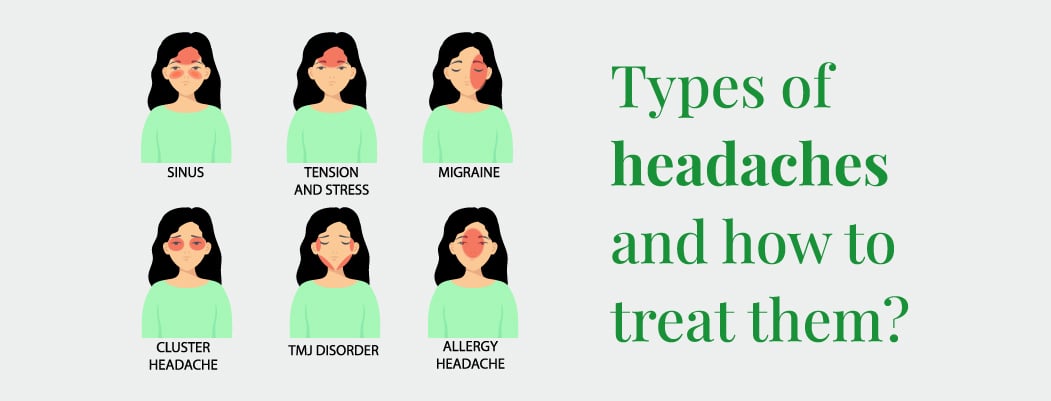Types of Headaches and How to Treat Them
March 8, 2023

Headaches are one of the most common medical complaints around the world. Almost everyone experiences a headache at some point in their lives. There are many different types of headaches, and each can have its own cause and treatment.
Types of headache
-
Tension headache
Tension headaches are the most common type of headache. They’re often described as a band-like pressure or tightness around the head. They’re caused by muscle tension in the neck, scalp, and jaw. Stress, poor posture, and anxiety are some of the common triggers of tension headaches. Relaxation techniques, including deep breathing exercises, yoga, and massage therapy, can also help to relieve muscle tension and alleviate headaches.
-
Migraines
Migraines are a type of headache that can cause severe pain on one or both sides of the head. Other symptoms, such as nausea, vomiting, and sensitivity to light and sound, often accompany them. Migraines are caused by changes in the brain and the surrounding blood vessels. Certain triggers, such as stress, hormonal changes, and certain foods and drinks, can trigger a migraine attack. Treatment for migraines can vary. Lifestyle changes such as regular exercise, healthy eating habits, and stress management techniques can also help to reduce the frequency and intensity of migraines.
-
Cluster headache
Cluster headaches are rare but very severe headaches that occur in clusters, usually for several weeks or months at a time. They’re often described as a sharp, stabbing pain on one side of the head, and can be accompanied by other symptoms, such as redness, tearing, and congestion of the affected eye. The cause of cluster headaches is unknown, but they may be related to the body’s biological clock or the release of certain chemicals in the brain. Treatment for cluster headaches may include high-flow oxygen therapy, prescription medications or nerve stimulation techniques.
-
Sinus headache
Sinus headaches are caused by inflammation or infection of the sinuses, which are located around the nose and eyes. They’re often described as a deep, throbbing pain in the forehead, cheeks, or nose. Other symptoms may include a stuffy or runny nose, fever, and facial swelling. Decongestants and nasal sprays may also be used to help clear the sinuses and reduce inflammation.
-
Rebound headache
Rebound headaches are a type of headache that occurs as a result of overusing pain medications. They’re often described as a dull, constant ache that can be difficult to relieve. Rebound headaches can occur in people who take pain relievers for headaches more than three times a week for several months. The best treatment for rebound headaches is to stop taking the pain medications that are causing them. A healthcare professional may also recommend alternative pain management strategies to help manage the pain.
-
Hormonal headache
Hormonal headaches are typically associated with changes in hormone levels in the body. They commonly occur in women during menstrual cycles, pregnancy, and menopause. These headaches are often treated with pain relievers, hormone therapy, or birth control pills.
-
Cervicogenic headache
Cervicogenic headaches are caused by problems in the neck, such as poor posture, injuries, or arthritis. They often feel like a dull, aching pain on one side of the head, and may be accompanied by neck pain or stiffness. Treatment for cervicogenic headaches may include physical therapy, chiropractic care, or nerve blocks.
-
Thunderclap headache
Thunderclap headaches are a type of headache that comes on suddenly and severely, like a “thunderclap.” They can be a sign of a serious medical condition, such as bleeding in the brain or a ruptured aneurysm. If you experience a sudden, severe headache, seek medical attention immediately.
-
Exertion headache
Exertion headaches occur during or after physical activity, such as exercise, coughing, or sex. They are typically caused by increased pressure in the head and neck blood vessels. Treatment may involve rest, hydration, and avoiding activities that trigger the headaches.
It’s important to note that there are many other types of headaches, and each may have its own unique causes and treatment options. If you experience frequent or severe headaches, it’s important to speak with a healthcare professional to determine the best course of treatment for your specific condition.
-
Ice pick headache
Ice pick headaches are brief, intense headaches that feel like a sharp, stabbing pain. They typically last only a few seconds to a minute, but can occur several times a day. The cause of ice pick headaches is unknown, but they may be related to nerve irritation or inflammation. Treatment may include preventive medications, nerve blocks, or lifestyle changes.
-
Allergy or sinus headache
Allergy or sinus headaches are caused by inflammation or congestion in the sinuses. They are typically accompanied by other symptoms, such as a stuffy or runny nose, fever, and facial swelling.
-
Caffeine headache
Caffeine headaches occur when someone regularly consumes caffeine and then abruptly stops. They can cause a throbbing pain and may be accompanied by other symptoms, such as fatigue, irritability, and difficulty concentrating. Treatment may include gradually reducing caffeine intake or prescribed medications.
-
Hypertension headache
Hypertension headaches are caused by high blood pressure. They typically feel like a dull, throbbing pain on both sides of the head and may be accompanied by other symptoms, such as dizziness and nausea. Treatment may include lifestyle changes, such as exercise and a healthy diet, and medication to lower blood pressure.
-
Rebound headache
Rebound headaches are caused by overuse of pain medications. They typically occur when someone takes pain relievers for headaches more than three times a week for several months. Treatment involves stopping the use of pain medications and may include alternative pain management strategies.
-
Post-traumatic headache
Post-traumatic headaches are caused by head injuries, such as concussions. They typically occur within a week of the injury and may be accompanied by other symptoms, such as dizziness, confusion, and memory problems. Treatment may include rest, medication, and rehabilitation therapy.
-
Spinal headache
Spinal headaches are caused by a leak of spinal fluid from the spinal cord or brain. They typically occur after a spinal tap, epidural, or spinal anesthesia. They are characterized by a throbbing pain in the head and neck and may be accompanied by other symptoms, such as nausea and vomiting. Treatment may include rest, hydration, and medication to manage pain.
It’s important to note that these are just a few examples of the many different types of headaches. If you experience frequent or severe headaches, it’s important to speak with a healthcare professional to determine the best course of treatment for your specific condition.
When to see a doctor?
See a doctor for headaches that are severe, persistent, or accompanied by fever, stiff neck, numbness or weakness in the limbs, confusion, vision changes, or head injury. Consult a primary care physician or a neurologist.
People also ask
-
What are the 6 types of headaches?
The six types of headaches are tension headaches, migraine headaches, cluster headaches, hormonal headaches, cervicogenic headaches, and thunderclap headaches.
-
What types of headaches should I worry about?
You should seek medical attention for any sudden, severe headache, or if you experience a headache that is accompanied by symptoms such as fever, neck stiffness, confusion, weakness, or numbness. You should also see a doctor if you have headaches that are getting worse or more frequent over time, or if your headaches are interfering with your daily life.
-
What causes daily headaches?
Daily headaches can have a variety of causes, including stress, tension, anxiety, depression, sleep disorders, medication overuse, and underlying medical conditions such as high blood pressure or thyroid problems. Identifying the underlying cause is important for effective treatment.
-
Which type of headache is worse?
It’s difficult to say which type of headache is worse because each individual may experience different levels of pain and discomfort with each type of headache. However, migraine headaches are often considered to be one of the most severe types of headaches due to the intensity of the pain and the accompanying symptoms, such as nausea, vomiting, and sensitivity to light and sound.








